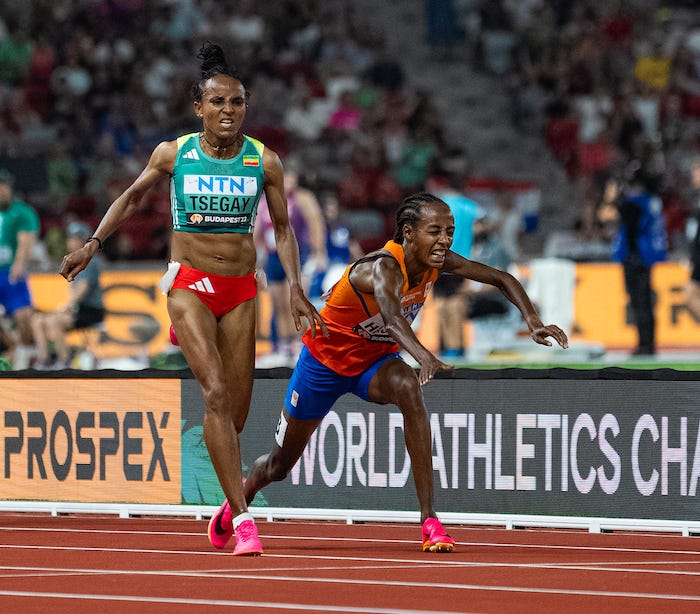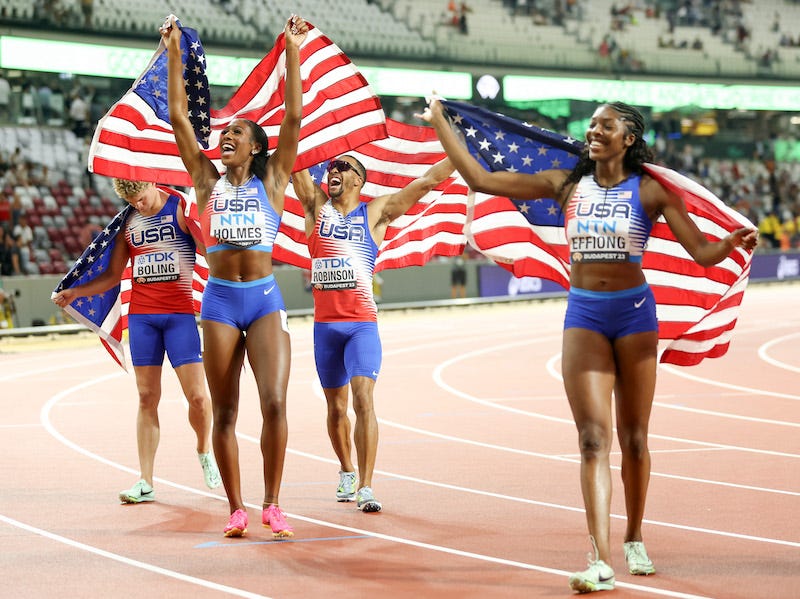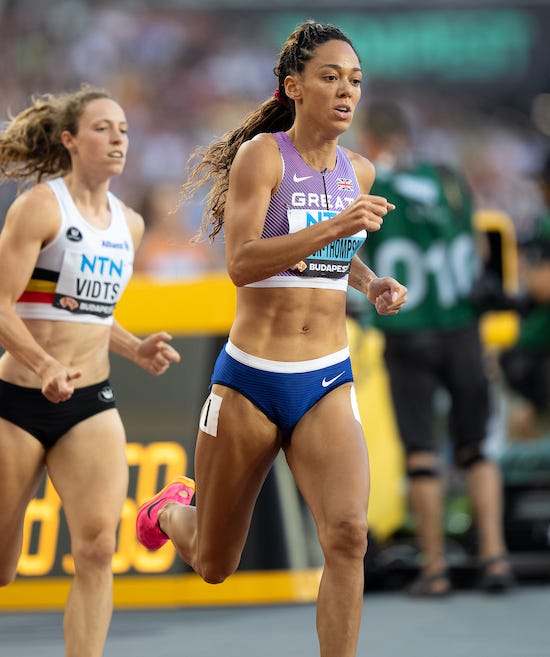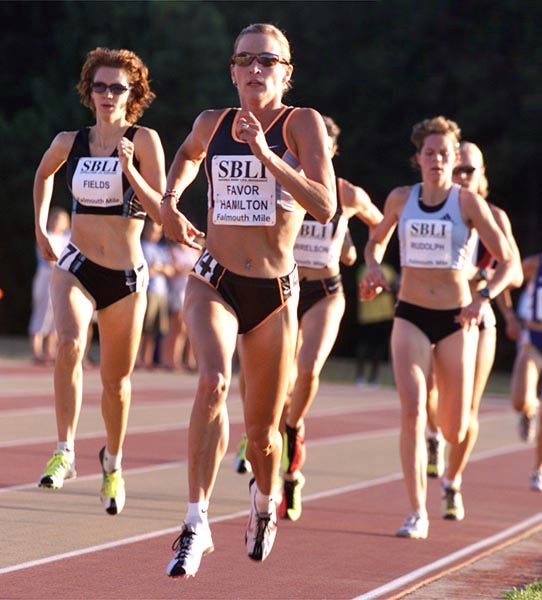Fast Women: Lightning strikes twice for the Netherlands
Impressive 1500m semis set up epic final.
Issue 252, sponsored by New Balance
During the World Athletics Championships, I’ll be sending out at least one extra newsletter. I’ll return to the Monday-only schedule next week. I’m honored to have Amy Roberts in Budapest, taking photos for Fast Women. I’m not going to be able to fit many of them in here, but follow Amy and Fast Women on Instagram for more coverage.

Gudaf Tsegay wins a 10,000m with a surprise finish
With one lap remaining in the world championships 10,000m final, there were still 11 runners in medal contention. But the best runners in the world have this extra gear, and when Sifan Hassan of the Netherlands made her move with just under 300m to go, only three athletes were able to go with her. (If you look at Hassan’s splits, it’s because she dropped 100m splits of 14.16 and 14.00. Winner Gudaf Tsegay split 14.67, 13.91, and 14.04 for her last three 100s, or 42.62 for the last 300m. In other words, it was fast.)
Entering the homestretch, Hassan still had the advantage, but she had Tsegay, who has run 1:57 in the 800m and is an excellent kicker, on her shoulder. With about 20 meters to go, it looked like anyone’s race. Hassan drifted wide, there was some contact between the two runners, and Hassan went down. I’ve watched the race highlights quite a few times, and I’m not convinced that the contact led Hassan to go down. But she did, after running a fantastic race for 9,980 meters, only six and a half hours after winning her 1500m prelim. The results will show that she crossed the finish line in 11th place, but they really don’t tell the whole story.
With Hassan out, the three Ethiopians who had gone with her, Tsegay (31:27.18), Letesenbet Gidey (31:28.16), and Ejgayehu Taye (31:28.31) were able to sweep the medals. Gidey kindly went back and consoled Hassan, who looked like she couldn’t believe what had happened.
Kenya’s Irine Jepchumba Kimais finished fourth (31:32.19), and Alicia Monson (fifth, 31:32.29) almost caught her as she let up a little bit at the finish line. Monson was thrilled to take fifth, expressing only a little regret that she couldn’t quite catch Kimais. It’s an eight-place improvement on her world championships finish from a year ago, and Monson is hoping it’s a step toward a medal in 2024. But medaling is only getting tougher, and anyone who is going to do it is likely going to need to be able to drop a 42-second 300m at the end of a race.
I thought U.S. champion Elise Cranny, who blasted away from Monson at USAs and has since run a 4:16.47 mile, might have an outside shot at hanging with the world’s best in a kick. But she began to fall off the lead pack with around a mile to go and finished 12th in 31:57.51. After the race, Cranny didn’t have an explanation for what happened.
Natosha Rogers was not happy with her 14th-place finish, which was a one-place improvement over last year. Rogers said she’d be back with a vengeance for Wednesday’s 5,000m heats, and I hope she and Cranny can both put together races that feel more indicative of their fitness.
I tweeted about Rogers saying (on C Tolle Run, which I mentioned here two weeks ago) that one of her goals for this meet was to earn health insurance. People understandably flipped out a little about how messed up it is that she’d have to perform to earn health insurance. I wouldn’t necessarily put that on USATF, though. But that also has me thinking about some of the hidden perks and contract bonuses that go with running well at worlds, beyond finishing on the podium, that most of us don’t know about. (10,000m results | Really detailed results, for the nerdiest of fans)

A young U.S. team pulls off an upset, sets a world record
First, if you haven’t already seen the mixed gender 4x400m relay final, it’s fantastic, and you can watch it here.
When the mixed 4x400m was introduced at the world relay championships in 2017, it felt kind of gimmicky to me. The 400m runners already had a 4x400m relay. I would have preferred if a new set of athletes had the opportunity to run a relay. But the event has grown on me, and it’s become more fun to watch as they’ve standardized the man-woman-man-woman running order. And as of Saturday’s final at the world championships, I am a big fan.
The commentary made the race even more exciting, as we heard from the beginning how young and inexperienced Team USA was. Justin Robinson, 21, led off for the U.S. in 44.47, handing off with a slight lead. And as early as leg two, run by Rosey Effiong, 22, in 50.38, Ato Boldon began talking about the fact that Femke Bol of the Netherlands was going to be the best anchor leg. And it was a realistic expectation.
Matthew Boling, 23, ran the third leg in 45.13 seconds and handed off the baton a fraction of a second behind the Netherlands.
Sanya Richards-Ross, while Boling ran the third leg: “Matthew Boling needs to give Team USA a big lead for them to have a chance to [contend] for that gold medal.
Boldon: “You said it, Sanya. If Team USA does not have a huge lead, Femke Bol is going to romp the Netherlands to victory.”
Boldon, as Bol got the baton in the lead: “This is not gonna be close.”
Boldon, with about 200m remaining: “I would be shocked if Femke Bol gives up this lead.”
Richards-Ross, after the finish: “Ato, we spoke too soon.”
They were wrong, but their confidence about the outcome made the race all the more exciting. When Bol, who is only 23 herself, got the baton, she began to open a slight lead over Alexis Holmes, also 23. But Holmes kept Bol close. And with about 150m to go, Holmes began to close the gap, almost imperceptibly at first. As the two runners approached the finish line, it looked like Holmes had a shot at the win. But as she closed on Bol, Bol tensed or cramped, and fell to the track, dropping the baton. And Holmes crossed the finish line in 3:08.80, a world record.
It was eerie to watch a similar storyline play out for the Netherlands two races in a row, though Bol’s fall came even closer to the finish line. “There appears to be some lactic sniper in the stadium, who really does not like The Netherlands,” tweeted journalist Cathal Dennehy.
Holmes’ open 400m PR is 50.32, but she split 48.82 on the anchor leg. She didn’t make it out of the semis at U.S. nationals last month, but she made the relay pool. She wasn’t even originally scheduled to run the anchor leg—that was going to be Gabby Thomas’ role. (Though it sounds like Thomas may have jumped the gun by saying she was running during the press conference.) The relay coaches apparently thought there was more to gain by subbing in Boling for Ryan Willie, who ran the prelims, and teams can only make one substitution between the prelims and finals.
It would have been considered a good day if the U.S. had earned silver here. But Holmes, a first-year pro for Nike, had a big opportunity in front of her, and she took full advantage of it. “I feel like they were sleeping on us a little bit because of how young we are,” she said in the post-race press conference. “I feel like we did a good job of proving them wrong.”
Thomas voiced her support for Holmes and the team after the race, tweeting, “This is an Alexis Holmes stan account!!! Congratulations to our mixed 4x4 team 🇺🇲 That was an EPIC effort 👏🏼🥇”
Holmes is originally from Hamden, Connecticut, and she started out at Penn State before transferring to Kentucky. Her highest individual finish at NCAAs was fourth, but she had some strong relay experience, helping Kentucky set a collegiate record in the 4x400 last year. And Effiong helped Arkansas set a collegiate record in the 4x400m indoors earlier this year.
Because Bol dropped the baton when she fell, the Netherlands team that ran a fantastic race most of the way was listed as a DNF. “I feel great,” Bol told reporters after the race. “Today I didn’t show it. I would like my revenge.” So watch out. She still has the 400 hurdles and the (women’s) 4x400m to go. Great Britain earned silver (3:11.06), and the Czech Republic took bronze (3:11.98), with both teams setting national records in the relatively new event.
Thanks to New Balance for sponsoring Fast Women
A huge thanks to New Balance for supporting Fast Women and our coverage of the world championships. I’ve mentioned quite a few different shoes here recently, but my trusty standby is the Fresh Foam X 880v13, which I practically live in. And I know from talking to some of the pros that it’s a go-to shoe for many of them as well. I particularly love the cushioning and how well it fits my wide foot. But this shoe has something for everyone—it comes in four different widths! The options are narrow, standard, wide, and x-wide.
You can check out the 880s at NewBalance.com via the link above or try them out at your local run specialty store.

The 1500m rounds were unforgiving, as expected
As of these championships, World Athletics has gotten rid of time qualifiers in events like the 1500m. It makes the rules simple—the top six runners in each heat and semifinal advance. But it also made for some really tough breaks, especially in Sunday’s second semifinal, which had more of the heavy hitters and was a quick race.
Kenya’s Faith Kipyegon won in 3:55.14, with Ethiopia’s Diribe Welteji (3:55.18) and Hassan (3:55.48) right behind. The top nine athletes broke 4:00. Adelle Tracey ran a Jamaican record of 3:58.77, but because she was seventh, she’s out.
Cory McGee and Sinclaire Johnson had the better fortune of being in the first heat, where the six athletes who advanced all ran 4:02. McGee took fourth in 4:02.71 and advanced, while Johnson started to drop back with about 200m to and finished 11th in 4:06.39. Nikki Hiltz ended up in the second heat and would have had to run a decent PR to advance. They weren’t that far off, running 4:00.84, but that was only good enough for 11th in the second semifinal. It’s a shame, because Hiltz has been on such a roll this season. This isn’t the end, though, they’ll run the Fifth Avenue Mile on September 10.
“I may have missed my goal of making a world final but in so many ways I feel like I won,” they wrote in an Instagram story. “I showed up as myself on the world stage…I’m so proud of how far I’ve come.”
Sinta Vissa of Italy and the OAC was the fastest runner not to advance from the first round, despite running a personal best and Olympic qualifier of 4:01.66. And behind her, Sophie O’Sullivan of Ireland and the University of Washington ran 4:02.15, an incredible five-second PR, but only finished eighth. O’Sullivan started the year as a 4:17 1500m runner, so her recent trajectory has been mind-blowing. She’s going to be a tough one to beat in the NCAA during the 2023–24 season. (1500m results | Video of the second 1500m semifinal)

Other world championships news
The heptathlon had a spectacular finish, and I thought this NBC segment did a great job of summarizing the action and setting up a dramatic 800m, which decided the medals. Anna Hall won the 800m in 2:04.09, which moved her from bronze to silver, but Hall didn’t beat Great Britain’s Katarina Johnson-Thompson, who ran 2:05.63, by quite enough. So KJT won gold with 6,740 points, and Hall earned silver, only 20 points back. Anouk Vetter of the Netherlands won bronze with 6,501 points. (Results)
Serbia’s Ivana Vuleta won the long jump with a leap of 7.14 meters. Tara Davis-Woodhall earned silver (6.91m), and Romania’s Alina Rotaru-Kottmann earned bronze (6.88m). (Results)
Spain’s María Pérez won the 20K race walk in 1:26:51. (That’s 6:59/mile, walking.) Australia’s Jemima Montag earned silver, and Italy’s Antonella Palmisano earned bronze. (Results)
Exactly four months after giving birth, reigning 400m world champion Shaunae Miller-Uibo of the Bahamas ran her first 400m of the season, finishing seventh in her heat in 52.65. She did not advance, but that’s super impressive running. (Post-race interview)
Britton Wilson, who at her best is one of the best 400m runners in the world, had an uncharacteristically tough race in Sunday’s 400m heats. She faded dramatically in the last 100m and finished eighth in 53.87. She left the track in a wheelchair, in tears. I don’t know the full story there, but Wilson has had a very long year of racing, and she has also struggled with injuries. The weather was also very hot, and the tent where the athletes waited to compete was apparently particularly unbearable.
It has been confirmed that Athing Mu is in Budapest. Still no word on whether or not she’ll line up for the first round of the 800m on Wednesday morning, but the fact that she made the trip is a good sign.
Other News and Links
In light of Hungary hosting the world championships, this was an interesting article about the phenomenon of countries with authoritarian leaders spending millions to host major sporting events and hopefully improve their image internationally.
Scott Cacciola wrote a good article about the On Athletics Club for The New York Times (gift link). I’m a fan of what they’re doing, but as I read it, I couldn’t help but notice it’s a team that was built by men around a man. I dream of the day more teams are built around women. There’s a mention of the fact that when Andrew Wheating first pitched the idea for the team, he wanted them to have new uniforms every meet, and I’m bummed that they scrapped that idea. I think it would be fun if pros switched their uniforms up way more often, or if they were a lot more creative about what they wear. Speaking of which, check out Honduras’ world championships uniforms.
This is a nice article about Faith Kipyegon.
I appreciated Rebecca Mehra’s honesty in her update about her injury and illness struggles over the past couple of years. “I was taught in high school that with running ‘you get out what you put in,’ and sometimes that just isn’t the case,” she wrote.
Nikki Hiltz got some nice coverage from The New York Times (gift link) and NBC Sports in advance of the world championships.
The young readers edition of Alexi Pappas’ book, Bravey, comes out tomorrow. It’s for ages 10 and up and it includes some great advice for kids. I read an advance copy of the book and the themes are mostly similar to those in the original version of her book, which I thought was fantastic. I think it could be particularly good for young athletes and/or those who are struggling with their mental health. But because there’s discussion of self harm and suicide, especially in the section about her mother, it’s worth reviewing it to make sure you think the kids in your life are ready to consume that. This is a busy week for Pappas, who finished the Leadville Trail 100, her first 100 miler, over the weekend.
Erin Strout wrote a great article about menopause and running for Women’s Running. I thought the section about eating disorder risk was particularly interesting, because I’ve thought about that, based on some of the advice that’s out there, but hadn’t actually seen it discussed before.
Strout also wrote a nice article about Krissy Gear for Women’s Running. I had read elsewhere that Gear has been trained to work as a court-appointed special advocate, but this was the first place I’d heard what motivated her to do so, and it was touching. She said her parents went through a custody battle, and she wished she had someone to advocate for her as a kid, so she wants to be that for others now.
This was an interesting article about Namibia’s Christine Mboma, who, as a DSD athlete, can’t compete until she lowers her testosterone levels. She says that even with the estrogen she’s taking, she can run just as fast as before. Sadly, if she does, there’s a good chance the rules will get changed again, to exclude her.
The Berlin Marathon announced more of its elite field last week, and I was interested to see Ethiopia’s Senbere Teferi in there. Her PR is 2:24:11, from 2018, but she has a ton of untapped potential in the event. Annie Frisbie is the only American woman in the pro field. Canada’s Malindi Elmore is also scheduled to run, but her life just got a lot more stressful as she spent the last several days fleeing a wildfire very close to her home.
World Athletics announced that San Diego will host the 2025 World Athletics Road Running Championships and Eugene, Oregon, will host the 2026 World U20 Championships.
Additional Results
Hellen Obiri, of Kenya and the On Athletics Club, won the Falmouth Road Race, which is seven miles, in 35:13. Emily Sisson was 25 seconds behind Obiri at 10K but made up a little ground in the last 0.8 miles, taking second in 35:32, 19 seconds back. Kenya’s Cynthia Limo finished third in 35:50, and Weini Kelati took fourth in 36:07. It was also nice to see Molly Seidel run her strongest race of the year; she finished eighth in 36:44. (Results | More coverage)
Emily Mackay held off a strong challenge from Dani Jones to win the Falmouth Mile, 4:23.79 to 4:24.17. On a windy evening, Mackay broke Suzy Favor Hamilton’s 2002 event record and earned a total of $6,500 for the win and record. Both athletes set personal bests, and third-place finisher Angel Piccirillo (4:27.26) broke 4:30 for the first time. (Results)
Ethiopia’s Bertukan Welde won La Carrera Del Pacifico 10K, in Cali, Colombia, in 32:19, Kenya’s Daisy Kimeli was second (33:06), and Dakotah Lindwurm finished third in 33:22. (Results)
Jacquie Mannhard won the Leadville Trail 100 in 21:24:55. (Results)
Podcast Highlights
Nia Akins provided a pre-race update from Budapest on the Citius Mag podcast.
I enjoyed hearing from Susanna Sullivan on the Ali on the Run Show, because she’s not a frequent podcast guest. The sixth-grade math teacher will run the marathon at the world championships early Saturday morning.
Kara Goucher and Des Linden talked about the noon Trials start on Nobody Asked Us, expanding on views they’d mostly already expressed elsewhere. Goucher said that there’s an email going to the athletes soon that will explain everything better, so I look forward to hearing more about that.
Additional Episodes: Justine Fédronic, Oiselle’s new community and athlete partnerships manager, on Keeping Track | Val Constien provided an update on her return to running, and much more, on Lactic Acid | DIII national champion Noel Whitall-Johnson, who is now a high school coach, on Talking in Ovals
I always forget how all-consuming it is trying to keep up with these days-long track meets, so I’m thankful there’s no morning session at the world championships today. Today’s event to watch is the women’s 100m semis and final. The semis are at 2:35 p.m. ET and the final is at 3:50. All of today’s action will be on USA and Peacock. The Peacock coverage is the same as the network coverage, so $5.99 to watch a nine-day track meet is an excellent deal. If you’re ever confused about which network is showing what, this is a helpful link, and Peacock is showing everything.
Distance-wise, the women’s 1500m final is at 3:30 p.m. ET on Tuesday. Wednesday is going to be a big day with 800m heats at 4:05 a.m., 5,000m heats at 5:10 a.m., and steeplechase heats at 1:45 p.m. The full meet schedule is here.
Thanks to New Balance for sponsoring Fast Women. Thanks to all of you who contribute via Patreon and Venmo to help make this newsletter and the accompanying social media sustainable. And if you’re interested in purchasing Fast Women merchandise, you can do so here. I hope you all have a great week!
Alison





